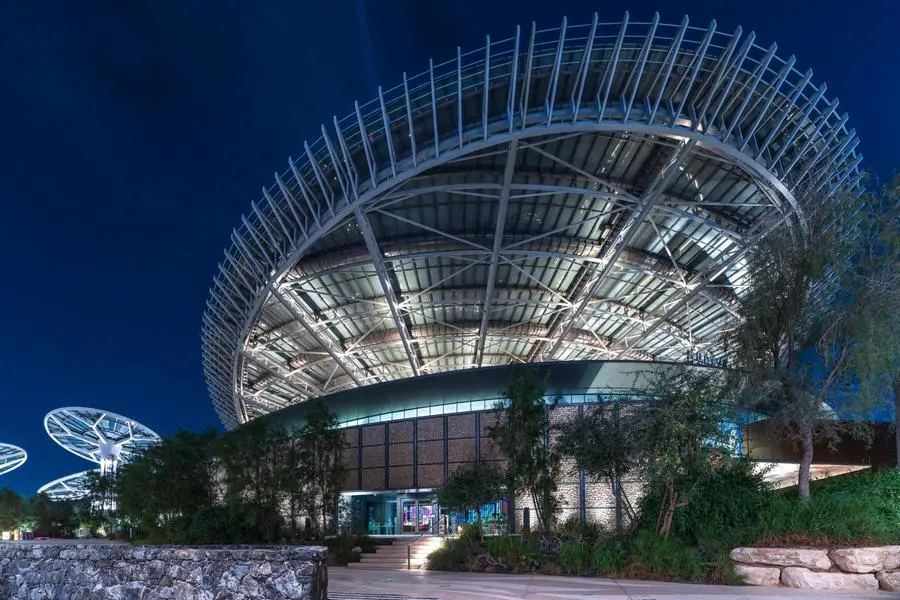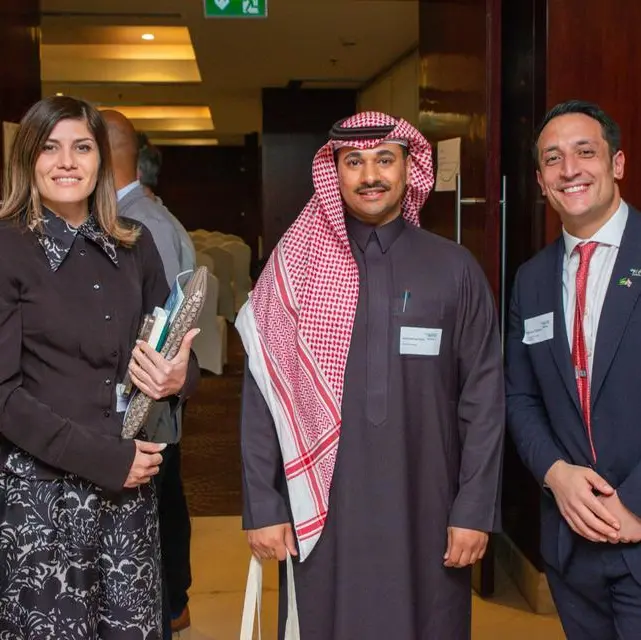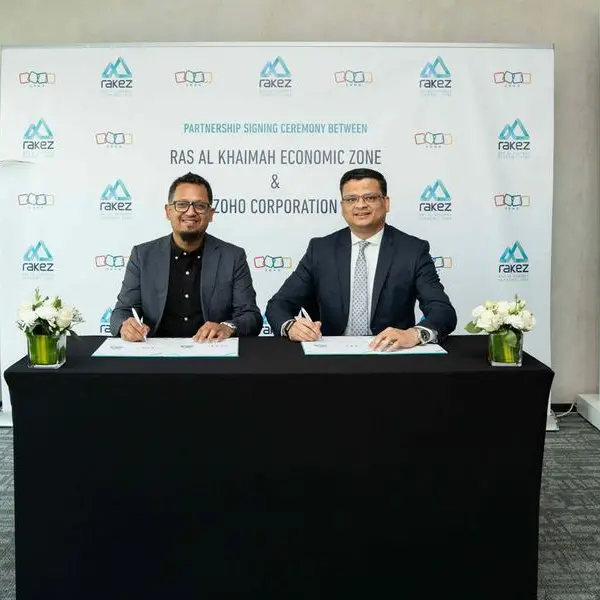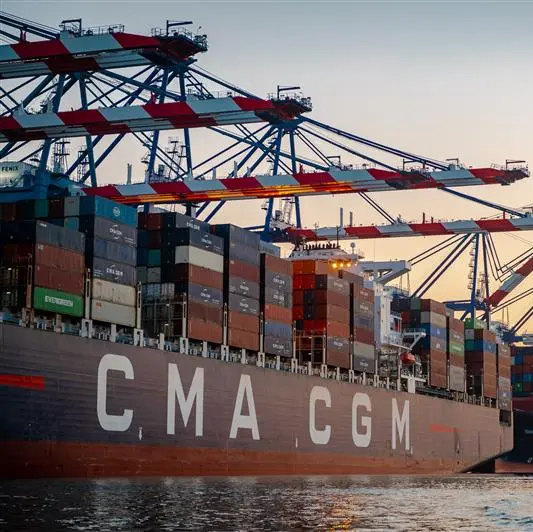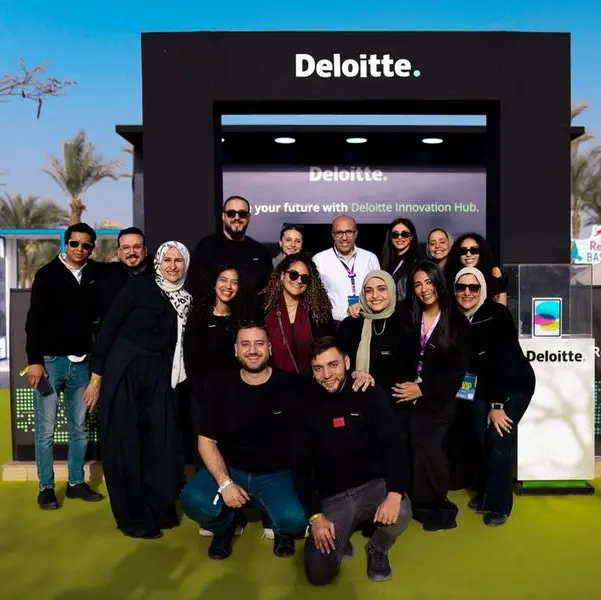PHOTO
Overview
- Designed as a blueprint for sustainable urban living and galvanising action on its journey to net zero, Expo City Dubai is an inclusive, innovation-driven, people-centric city committed to maximising its positive social, environmental and economic impact
- Building on the legacy of Expo 2020 Dubai, Expo City continues and expands the event’s vision of a sustainable future, existing in harmony with nature and engaging the public on social and environmental issues
- Expo City embodies the principles of sustainable development, respecting the planet and encouraging prosperity and wellbeing while enhancing quality of life for all, under the key objectives of a sustainable built environment; sustainable operations; an engaged community; and net zero by 2050
- Its sustainability strategy contributes to the Dubai 2040 Urban Master Plan, the national ‘Green Economy for Sustainable Development’ initiative, the ‘We the UAE 2031’ vision, the UAE Centennial 2071 Plan, and the 2030 Agenda for Sustainable Development
- Testament to its commitment to sustainability and to enabling action towards climate security, Expo City Dubai is the proud host of the COP28 UAE climate conference, which annually assesses global progress on combatting climate change and meeting the goals of the Paris Climate Change Agreement
Net zero by 2050 (decarbonisation roadmap available at expocitydubai.com/sustainability)
- Committed to making a meaningful impact with a downward emissions trend across all activities, Expo City Dubai plans to achieve net zero by 2050 in support of global and national climate goals, including the UAE Net Zero 2050 strategic initiative
- Expo City has set a number of interim targets for its operational carbon footprint, including reductions of 45 per cent by 2030 and 80 per cent by 2040, ahead of achieving net zero by 2050
- As a growing community that recognises the impacts of carbon in city development, Expo City also aims to reduce embodied carbon in the built environment, such as in construction materials, targeting a 40 per cent reduction by 2030, and 100 per cent reduction and offset by 2050. By setting such targets, it is going beyond the requirements defined by the Global Protocol for Community-Scale Greenhouse Gas Inventories (GPC) for urban centres
- Expo City’s decarbonisation roadmap enhances existing policies and programmes launched under Expo 2020 Dubai’s event-focused Carbon Management Programme and will introduce new initiatives while aligning with internationally recognised standards and guidelines
- Under Expo 2020, greenhouse gas (GHG) emissions were minimised via sustainable mitigation strategies, which led to a reduction in emissions of almost 10 per cent compared to a ‘business as usual’ scenario, while an additional five per cent reduction was due to carbon offsets
Sustainable architecture and built environment
- Expo City Dubai retains 80 per cent of Expo 2020-built infrastructure, including 123 buildings that achieved LEED (Leadership in Energy and Environmental Design) certification: seven Platinum; 105 Gold; nine Silver; and two Certified
- LEED, from the US Green Building Council, is the most widely used green building rating system globally, focusing on energy and water consumption, operational costs and carbon footprints, construction materials and impacts, indoor air quality, community, and a sustainable urban environment
- Eight infrastructure projects across Expo City Dubai have also achieved an ‘Excellent’ rating under BREEAM Infrastructure, the highest possible rating given by an internationally recognised sustainability assessment for civil engineering, and a first for a project in the Middle East
- One of the largest rosters of BREEAM Infrastructure awards on a single site globally, the ‘Excellent’ certificates highlight the incorporation of sustainable design principles across buildings, infrastructure and landscaping
- The city features centralised site-wide smart technology which uses smart metering and sensors to monitor the consumption of power and water and the generation of waste
- The city builds on Expo 2020’s successes, which included a 33 per cent reduction in energy demands compared to international standards and a 53 per cent reduction in building water demand compared to local standards, with 100 per cent of non-potable applications designed to use recycled water
Terra – The Sustainability Pavilion (separate factsheet also available)
- Expo City Dubai’s Terra Pavilion offers an immersive, emotional journey through the wonders of the natural world, enabling visitors to understand and improve their environmental footprint to create a better, more sustainable future
- Designed to be net zero for both energy and water, Terra is LEED Platinum-certified – the highest available accreditation for sustainable architecture – setting an example for sustainable building design
- Energy is generated through photovoltaic panels, 4,912 of which are arranged on a 130-metre-wide roof canopy and atop a series of 18 ‘Energy Trees’ that rotate to face the sun, like sunflowers
- In total, the building’s technology produces four Gigawatt hours (GWh) of electricity per year
- A ‘Water Tree’ captures moisture from the air, and the grounds also feature innovative irrigation techniques, including a greywater recycling system, as well as native and desert-adapted plants, aimed at reducing water use by 75 per cent
- Further reducing energy needs, Terra is sited partially below ground, making for cooler temperatures; its solar roof acts as a giant shade; and the canopy’s funnel shape naturally ventilates the courtyard and lets in ambient light
A healthier and more balanced way of life
- Designed with holistic living in mind, Expo City is the first community in the region to have registered under the WELL Community Standard, which presents a framework for creating communities that prioritise the health and wellbeing of all inhabitants, and is targeting WELL Community Gold certification
- The city includes 45,000sqm of parks and gardens, running and cycling tracks, and children’s playgrounds
- Expo City prioritises native and adaptive species in its landscape plants, which consume less water, and more than 90 per cent of landscape areas are managed without the use of chemical pesticides, herbicides and fertilisers
- Designed with 15-minute city planning principles, its residential developments prioritise environmental sustainability, health and wellbeing (residential brochures available)
- As a people-centric community, Expo City enables human health and wellbeing through urban design and advanced technology, including smart living environments, micro mobility solutions, and autonomous vehicles (AV) routes
- Accessible via the Dubai Metro, the city’s districts are car-free to improve safety and air quality
- Outside the districts, visitors can benefit from 68 Electric Vehicle (EV) charging stations
Construction and operational sustainability guidelines
- Building on their successful implementation at Expo 2020, Expo City Dubai carries forward the Sustainable Materials Guidelines and RISE Guidelines
- Sustainable Materials Guidelines – for sustainable construction and procurement
- Aim to reduce the negative environmental, social, and economic impacts of all materials procured, drawing from and supplementing LEED principles
- Parameters relate to embodied carbon content, recycling, repurposing, responsible sourcing, regional procurement, and health impacts
- Examples of resulting practices or measures under Expo 2020, which will be carried forward under Expo City Dubai, include:
- more than 1 million tonnes of excavation material either reused or stored for reuse
- reduced embodied carbon in major construction materials, such as steel and concrete (20 per cent)
- extensive use of modular construction methods to reduce waste and energy
- replacement of road asphalt with recycled rubber (20 per cent)
- use of paints with low Volatile Organic Compound (VOC) content and sustainable timber certified by the Forestry Stewardship Council (FSC)
- RISE Guidelines – for sustainable operations and procurement
- Focus on maximising sustainability via vendors and suppliers, reflecting the belief that our sustainability ambitions require internal and external stakeholder engagement:
- Respect for the Workforce
- Impact for Communities
- Safety for All
- Environmental Stewardship
- Cover people, products, services and places associated with operations across areas such as packaging and single-use materials, food and beverage, retail, cleaning and waste management, and are practical and achievable
- Draw from environmental legislation from the European Commission, benchmarks from The Sustainability Consortium and contextual regional and local environmental and social policies, among others
- Focus on maximising sustainability via vendors and suppliers, reflecting the belief that our sustainability ambitions require internal and external stakeholder engagement:
Minimising waste and driving circularity
- Expo City builds on the model developed during Expo 2020 to understand its waste ecosystem, including types and sources of waste, which guided operational plans and waste processes. The principles of circular economy are central to the sustainability practices of the city and its stakeholders, from using recycled, biodegradable and recyclable materials, designing for re-use, and identifying technological solutions for its processing
- Expo City enhances Expo 2020’s waste management plans for land development activities and operations and will set even more ambitious targets, having diverted 88 per cent of cumulative waste from landfill under the World Expo. It is adapting the event waste management model to that of a 24-hour urban centre with residents, tenants and visitors and establishing a baseline for a growing community
- Across the city, smart bins that incorporate three streams of waste – organic, recyclable, and general – engage with visitors on how waste can be reused, leading to proper segregation methods and a higher separation rate
- The Food Rescue Programme (FRP) enables the collection of food surplus from Expo City F&B vendors, food halls and caterers and its distribution to communities in need with the support of the UAE Food Bank, while monitoring and recording data pertaining to the amount of repurposed food
Youth
- Expo City Dubai celebrates youth and empowers young people to play a role in the planet’s preservation
- The Expo School Programme builds on Expo 2020’s commitment to inspire the generation of the future, offering a wealth of educational and cultural experiences such as dedicated school journeys through Terra, workshops and interactive science shows
- The Expo School Programme runs the Climate Ambassadors Programme (CAP), in collaboration with the Ministry of Climate Change and Environment, which puts UAE high school students in the shoes of COP climate negotiators, simulating global climate change negotiations and allowing students to co-create environmental solutions
Expo Live (separate factsheet also available)
- A global innovation and partnership programme that launched under Expo 2020, Expo Live supports, accelerates and promotes novel and innovative solutions intended to make the world a better place
- Its latest cycle called on social entrepreneurs worldwide to submit ideas for climate-related interventions that can be shared and replicated, with selected start-ups receiving funding, support and exposure at COP28
- Since May 2016 and across six cycles, Expo Live has supported 176 Global Innovators from 90 countries, with a large proportion related to environmental sustainability. The programme’s first five cycles positively impacted 5.8 million people globally, including improving the livelihoods of 760,000 farmers, restoring 36 million hectares of land, offsetting 190,000 tonnes of CO2, and saving 6.3 million litres of water
One of the most sustainable World Expos in history
Sustainability in all its perspectives was embedded across every area of Expo 2020, which was awarded a range of global certifications aside from those that remain in legacy such as LEED-certified buildings and BREEAM-certified projects:
- ISO 20121:2012 Event Sustainability Management System Standard certified by Bureau Veritas, a world leader in testing, inspection and certification, to help organisations in the events industry improve the sustainability of their activities, products and services. Expo City is pursuing the same certification, embedding sustainability further into its management processes as a venue and for all events hosted in the city
- Gender Equality European and International Standard (GEEIS) – a major event-specific recognition of Expo 2020’s proactive approach to professional gender equality, certified by Bureau Veritas, which assessed gender equality using metrics such as salaries, promotions, skills development and external communications, alongside formal and political commitments to gender equality, in line with the United Nations Sustainable Development Goals (SDGs)
- Certified a Sensory Accessible Event by Sensory Access after meeting the standards and criteria set by the International Board of Sensory Accessibility, becoming the first World Expo and the first event in the entire Middle East, North Africa and Asia to be granted this certification
- Member of The Valuable 500 – a collective of global businesses and corporations dedicated to business inclusivity – and was the first event to be named as a member
Following in the footsteps of Expo 2020, Expo City Dubai will publish annual reports that align with reputable sustainable reporting frameworks to showcase its diverse economic, environmental and social impacts. Previous reports are available at expocitydubai.com.
For media enquiries, please contact press.office@expocitydubai.ae
twitter.com/ExpoCityDubai
facebook.com/ExpoCityDubai
instagram.com/ExpoCityDubai
youtube.com/c/ExpoCityDubai
linkedin.com/company/expocitydubai/
tiktok.com/@expocitydubai
